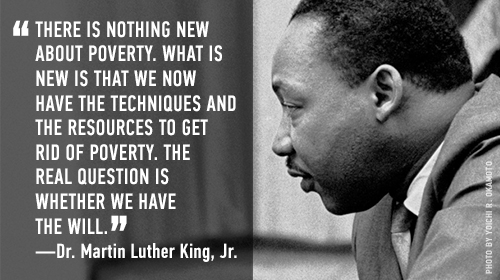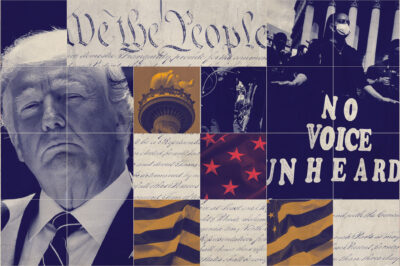The Fierce Urgency of Now: Honoring Dr. King by Working for Economic Justice


This week, as we celebrate the life of Dr. Martin Luther King, you’ll hear a lot, as we usually do, about the heroic work he did to move America past the era of state-enforced racial segregation. Mainly, we remember Dr. King as a prophet of non-discrimination. If the government treats black folks and white folks alike (which it does not always, even today), we tell ourselves that we have lived up to Dr. King’s mighty vision.
But Dr. King, and the civil rights movement as a whole, wanted much, much more for America. From the beginning, the civil rights movement sought economic justice, as well as racial justice. It recognized the colossal unfairness of persistent economic inequality in a nation which had built its wealth by exploiting the labor of enslaved people. As far back as the 1920s, A. Philip Randolph fought for access to well-paying jobs for African-Americans. In 1963, Dr. King delivered his “I Have a Dream” speech at a march titled “March on Washington for Jobs and Freedom.” By 1968, at the end of his life, Dr. King expressed the connection between racial and economic justice succinctly: “What does it profit a man to be able to eat at an integrated lunch counter if he doesn't have enough money to buy a hamburger?”
Sadly, despite what some believe, economic disparities between white and black Americans have not improved much since Dr. King’s death. Unemployment rates for African-Americans were, and are, twice as high as those for whites. In 1967, African-American households averaged about 55 percent of the income of white households. Now, that number stands around 59 percent. The story is even worse with regard to household wealth. Since the government began keeping this data in 1984, the average white household consistently held approximately ten times more wealth than the average black household. After the recent recession, which hit many Americans hard but hit people of color hardest, that ratio skyrocketed to a disparity of twenty-to-one.
So in 2014 the ACLU’s Racial Justice Program seeks to honor Dr. King’s legacy by carrying the torch of economic justice forward. Because home equity is such an important piece of the wealth disparity puzzle, we are fighting to hold Wall Street accountable for fueling predatory lending in communities of color. We are seeking answers from a federal agency about why it has sided with the banking industry over hard hit communities trying to stop foreclosures. We are challenging the unconstitutional incarceration of people too poor to pay fines and fees they owe local courts. We believe that what Dr. King said in Memphis in 1968 remains true today:
This is America’s opportunity to help bridge the gulf between the haves and the have-nots. The question is whether America will do it. There is nothing new about poverty. What is new is that we now have the techniques and the resources to get rid of poverty. The real question is whether we have the will.
Learn more about predatory lending: Sign up for breaking news alerts, follow us on Twitter, and like us on Facebook.




